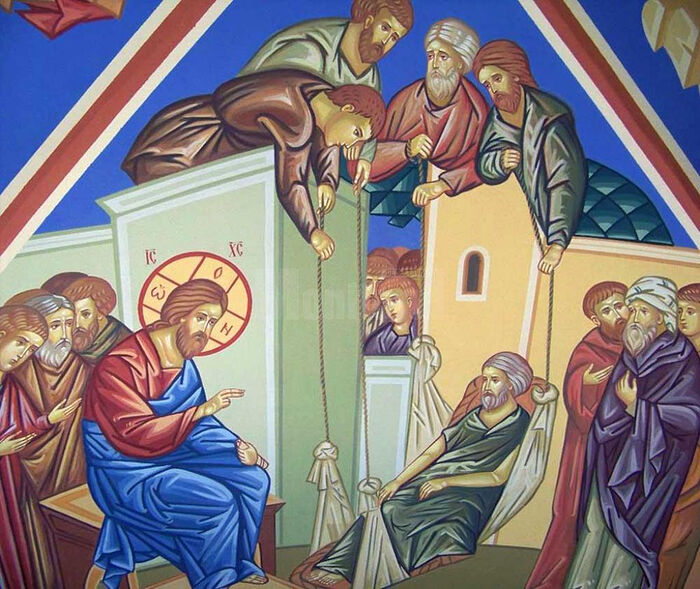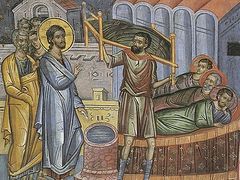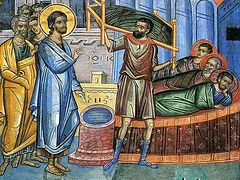After healing the leper in Galilee and after travelling to Jerusalem, Christ again came to Capernaum; And again he entered into Capernaum after some days; and it was noised that he was in the house. And straightway many were gathered together, insomuch that there was no room to receive them, no, not so much as about the door: and he preached the word unto them. Amongst the listeners, as the evangelist Luke testifies, There were Pharisees and doctors of the law sitting by, which were come out of every town of Galilee, and Judaea, and Jerusalem: and the power of the Lord was present to heal them.
Apparently at that time Christ healed many sick people, and as was His custom, He did this in the midst of crowds; but here the synoptic describes in detail the miracle of the healing of only one paralytic, who was brought into the house through the roof they they had broken up and placed on the floor before Jesus.
The evangelists tell us of this event: And they come unto him, bringing one sick of the palsy, which was borne of four. And when they could not come nigh unto him for the press, they uncovered the roof where he was: and when they had broken it up, they let down the bed wherein the sick of the palsy lay. When Jesus saw their faith, he said unto the sick of the palsy, Son, thy sins be forgiven thee.
Here, first of all, we have to notice that Christ works a miracle of forgiveness of sins for the paralytic, according to “their” faith; that, is, according to the faith of the four who had brought in the sick man. This is the mighty “conciliar faith” about which the Lord subsequently said, That if two of you shall agree on earth as touching any thing that they shall ask, it shall be done for them of my Father which is in heaven (Matt. 18:19).
Christ encourages the sick man himself and has mercy upon him with the authoritative word: Son, thy sins are forgiven thee. Be bold in your faith and hope; do not be afraid of the extraordinariness of this condition you’ve found yourself in, nor of this crowd of people surrounding you. You are sinful, but your sins are forgiven you, by the faith of those who pity you and love you, and by your own faith as well!
When they heard Christ’s words about the forgiveness of sins, the Pharisees and scribes were disturbed and began whispering amongst themselves, saying in their hearts, Why doth this man thus speak blasphemies? who can forgive sins but God only? These people were not capable of feeling in their hearts the presence of God Himself in their midst, and their religious dogmatics did not allow for the forgiveness of sins of a man by a man. They did not know—although they could have known, as “doctors of the law”—that any sickness is the result of sin.
Knowing in the spirit the thoughts of his opponents, Christ said to them, Why reason ye these things in your hearts? And right then He established before them the truth of the unbroken connection between sin and sickness. Whether is it easier, He asks the Pharisees, to say to the sick of the palsy, Thy sins be forgiven thee; or to say, Arise, and take up thy bed, and walk?
With these words, Christ as if placed an equal sign between these two concepts; that is, that if there were no sin, there would not be sickness. Sin is the general cause of mankind’s sickness and suffering. But authority over the powers of sin is in the hands of the Son of Man. And he is present here in the house, and he forgives this and heals!
And then Christ clearly explained to His opponents, But that ye may know that the Son of man hath power on earth to forgive sins, (then saith he to the sick of the palsy,) Arise, take up thy bed, and go unto thine house.
And the miracle took place: The paralytic rose and left in front of everyone, insomuch that they were all amazed, and glorified God, saying, We never saw it on this fashion. And Matthew says, But when the multitudes saw it, they marvelled, and glorified God, which had given such power unto men.
For these people, Jesus here was a “man” endowed with power from God. For the people, as can be seen, the entire truth of Christ as Son of God was not revealed, only one side of this truth. The mystery of His being the Son of God remained uncomprehended.




